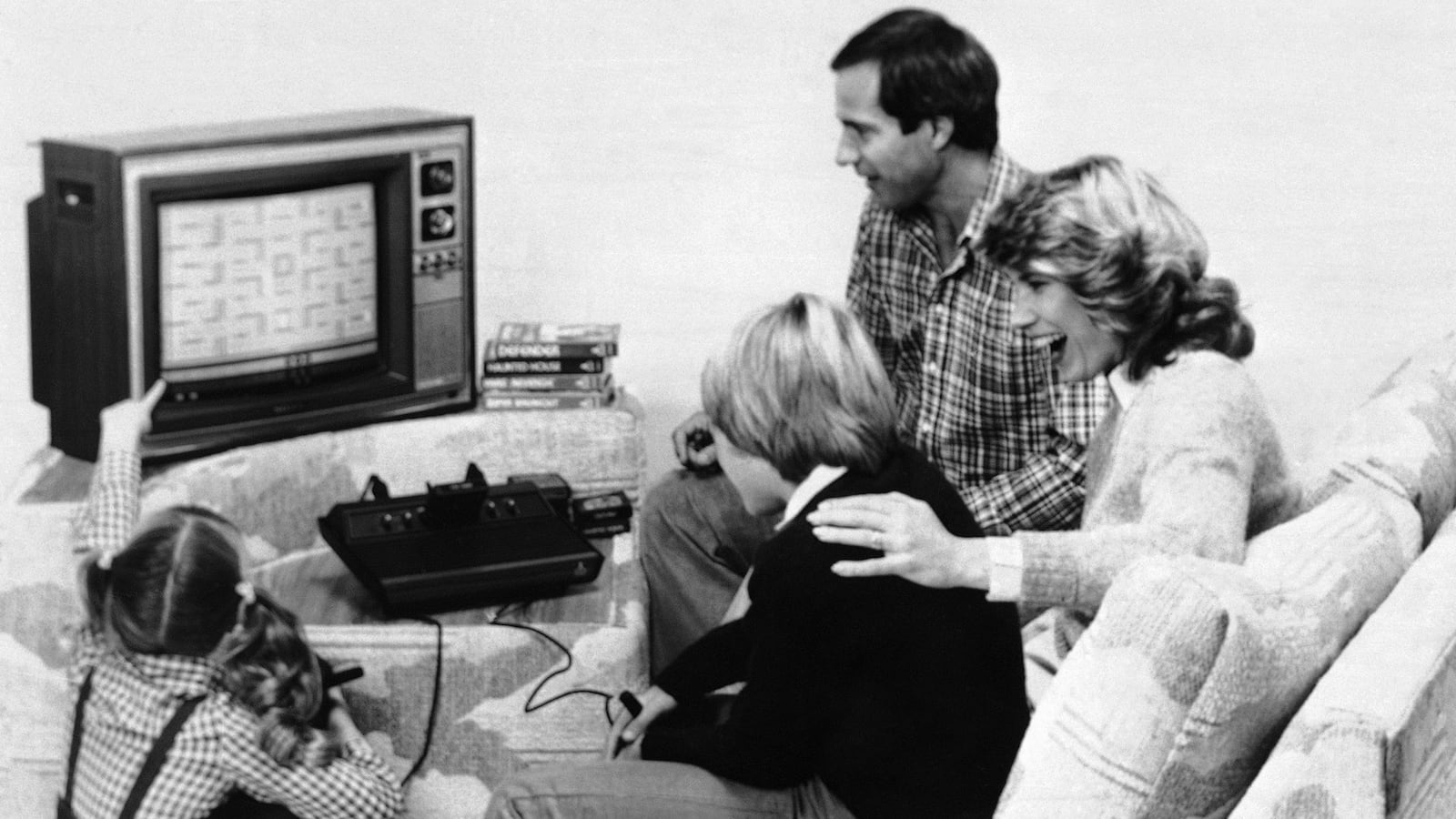To those of us who have done a lousy job of tracking the ups and downs of the inside of the videogame industry for the past several decades, the bankruptcy filing of Gen X–revered but nowadays-irrelevant Atari Inc. announced this week may have come as a complete shock—not because the company may soon cease to exist but because it still exists, in whatever bastardized, chopped-up, and owned-by-the-French form.

Atari had long ago watched its status dwindle from Video Game Original Gangster to that of Urban Outfitters T-shirt logos. As @kiala put it on Twitter, “Atari is filing for bankruptcy. #tweetsthatshouldhavebeenfrom1992.” Or Ray DeVito’s “…and in other news Milli Vanilli are considering retirement.”
But Atari never really went anywhere—that is the interesting thing. It has a Twitter following of more than 35,000, not to mention nearly a quarter of a million Facebook fans, some of whom are still very upset that Atari isn’t...well that part is kind of confusing.
“WHERE IS RCT4 WE WE’RE TOLD IT WAS COMING 2012. THAT HAS COME AND GONE. WHERE IS IT. WE DIDN’T WANT RCT3 3D THAT IS FOR A STUPID HAND HELD GAME SYSTEM. WE WANT IT FOR THE PC. NOW COME ON STOP WITH THESE OTHER GAMES AND BRING IT OUT. WE ALL RCT FANS ARE WAITING.”
That particular gem came from a Facebook fan who calls himself Tom Gene Stark, followed immediately by “atari is gone dude” from the next commenter, Claude Freeman. But hey, someone’s still paying attention, and Marty Goldberg insists that’s not as crazy as it might sound.
Goldberg is perhaps a tad biased, as co-author of the newly released book Atari: Business Is Fun, which surely will sell more copies if people still think the company matters. But he’s also happy to admit that it’s hard to even know what “Atari” is, at this point. It’s been split up and sold and resold so many times since the videogame industry’s version of the Great Depression—1983 to 1984—that it’s pretty hard to figure out which Atari is which, today. It was Atari Inc. and then Atari Corp. and then Atari Games and then Atari Interactive (a division of Hasbro Interactive), and now it’s a subsidiary of French publisher Atari, SA.
Wait, there was a Great Recession in videogames? Yes, and it arguably hit Atari harder than anyone, because Atari was so huge. Up to that point, in the 11 years since founders Nolan Bushnell and Ted Dabney started Atari and opened the floodgates, allowing anyone and everyone who wanted to take a crack at making videogames access its platform, the industry was exploding.
“They were the first to the party, and they made so much money early on that they were able to just get out there, spread out, and make a lot of different games,” said Jeff Gerstmann, cofounder of the videogame “encyclopedia” Giant Bomb, and a self-described “videogame historian.” “Back then, they were just kind of figuring it out for themselves, and they nailed it, a lot of the time.”
There were thousands of titles available for Atari consoles like the 2600. Pong was just one of them. There was even videogame porn. And Atari fan clubs.
“If you were really down with the action coming out of Sunnyvale, you sent $1 to Atari to join the Atari Club. (Of course I did this.)” writes Sam Grobart in Businessweek. “Membership did indeed have its privileges: You got a copy of Atari Age (the in-house magazine) every two months and you could—if your parents allowed—spend a week at an Atari computer camp. Atari computer camp! Hot summer days spent programming Atari PCs, competitive Frogger, and campfire songs about Qbert! My parents never let me go. I’m still a little sore about that.”
But it all came crashing down in 1983, in dramatic form and with blame at least in part laid directly at the feet of Atari, the kingpin of the industry. Many said the company’s lousy rendition of E.T. the Extra Terrestrial played a big role in turning mainstream America away from console videogames and toward personal computers, the next cool thing. Consoles eventually would bounce way back, of course, but the videogame industry's bubble burst so violently in the span of a single year that by the time the dust settled, only 3 percent of the industry was left, Gerstmann tells The Daily Beast. The fledgling industry suffered $500 million in losses.
“People decided they were done with videogames, for a while,” he said.
This development was not a good thing for Atari’s bottom line. It was Atari that laid the groundwork for this whole boom in the first place. One of Steve Jobs’s first jobs was at Atari, didja know? He refused to bathe or wear shoes, allegedly, so they made him work the night shift, but he worked there all the same.
“Atari is where it started, for a lot of people,” Gerstmann said. “Activision started from people who broke off from Atari, so in some sense, you could say Call of Duty might not be what it was without Atari.”
But the great videogame crash was the beginning of the end, at least for Atari’s stronghold on the industry. Ever heard of the Atari Jaguar? It was supposed to be the next big thing, back in 1993, but it got trounced in sales by the Sega Genesis and ultimately the Sony PlayStation. And Bushnell was distracted by Chuck E. Cheese, among other endeavors.
Atari’s bankruptcy filing—“the latest twist in the slowest slow-motion car crash ever,” as Gerstmann puts it—was largely a move to wrest the company out from under the debt load of its French parent, Atari SA, so that maybe the U.S.-based operation could scrounge up some cash for new ideas, via the sale of what remains a pretty good batch of intellectual property that includes Pong, Asteroids, Centipede, and Missile Command.
“Under current management, Atari Inc. has shifted its business from traditional retail games to digital games and licensing,” according to a company press release, with an increased focus on developing mobile games. And believe it or not, that strategy has worked, according to the company. Atari SA reported profitable years in both 2011 and 2012.
Whether Atari can edge its way back into the mainstream remains to be seen, though. The “slew of chart-topping titles for iOS and Android mobile platforms” the company crows about in its press release are geared mostly toward nostalgia buffs: there’s Atari Greatest Hits, Outlaw, Breakout, and Asteroids Gunner, and they’re all based on old-school offerings. They’re all not that fun to play, in other words—not compared with Call of Duty, at least.
“Most of it is trash,” Gerstmann said. “These are all great concepts that have been done and redone to death. I don’t know what you get (by buying Atari’s assets) other than the rights to sell T-shirts.”
That said, there is already a top-secret prospective buyer, Goldberg tells The Daily Beast, someone interested in doing something “legitimate” with the assets, “instead of just licensing them for T-shirts.” Many of the old games had much deeper storylines than the public ever found out about, Goldberg said. Asteroids, for example, had plot lines that included more-evolved Zylon warriors on a whole galactic mission. With modern advances in technology, those stories can be better fleshed out today.
Still, the company has no shortage of diehard fans. In 2011, at least eight babies were named “Atari.” This guy wrote a brilliant “Ode to Atari Frogger,” and on Facebook, Dylan Beattie penned this eulogy:
“Thank you Atari, you have provided me with countless hours of enjoyment, frustration, anger, happiness and most of all good challenges, i wish you were not out of business but the world today is full of sadness.”
Full of sadness, indeed.






